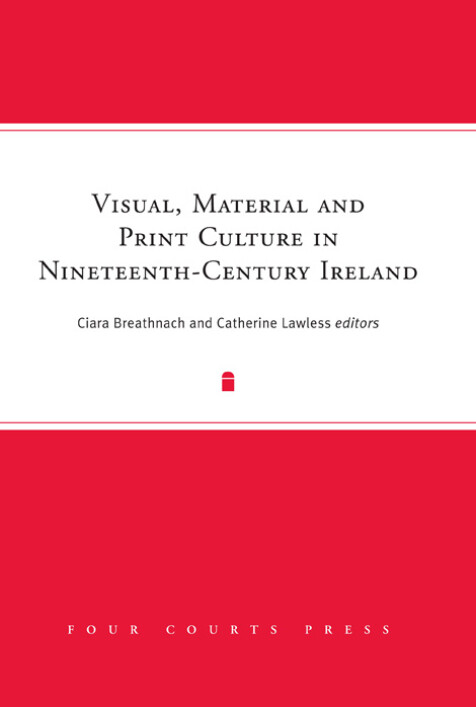Visual, material and print culture in nineteenth-century Ireland
Ciara Breathnach & Catherine Lawless, editors
History and memorials: fine art and the Great Famine in Ireland
Catherine Marshall
Troubled waters: high art and popular culture, Dublin, 1821
Niamh O’Sullivan
‘… merely an antiquarian curiosity’: the purchase of the reliquary of St Lachtin’s arm in 1884
Philip McEvansoneya
From the Comerford Crown to the Repeal Cap: fusing the Irish harp symbol with eastern promise in the nineteenth century
Emily Cullen
Margaret Stokes (1832–1900) and the study of medieval Irish art in the nineteenth century
Elizabeth Boyle
Devotion and representation in nineteenth-century Ireland
Catherine Lawless
Rome and Kenmare: Margaret Cusack and Ultramontane print culture
Patrick Maume
Pictures of piety and impropriety: Irish religious periodicals of the 1830s
Robin J. Kavanagh
Text and illustrations in Samuel Lover’s Handy Andy
Maxime Leroy
From painting to photograph: James Robinson’s The death of Chatterton
Leon Litvack
Resisting vision: photography, anthropology and the production of race in Ireland
Justin Carville
Two visions of Irish republicanism drawn up in captivity: John Mitchel’s Jail Journal and Michael Davitt’s Leaves from a Prison Diary
Olivier Coquelin
‘Always with a pen in his hand …’: Michael Davitt and the press
Carla King
Sources for the history of the Irish poor law in the post-Famine period
Virginia Crossman, Georgina Laragy, Seán Lucey & Olwen Purdue
Two gentlemen of the Freeman: Thomas Sexton, W.H. Brayden and the Freeman’s Journal, 1892–1916
Felix M. Larkin
The Melbourne Advocate, 1868–1900: bastion of Irish nationalism in colonial Victoria
Pat Naughtin
A new stage for the stage Irish: Sydney 1844, Lanty O’Liffey and The Currency Lass; or My Native Girl
Kiera Lindsey
‘The emigrats’ friend’? Guides for Irish emigrants by clergymen, c.1830–82
Sarah Roddy
‘Mar is fánach mac a’ teacht go cruinn mar ‘athair’: Dáibhí de Barra’s surviving translations
Sean Ó Duinnsléibhe

